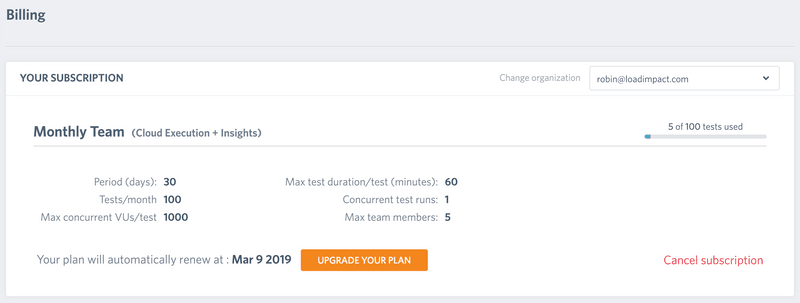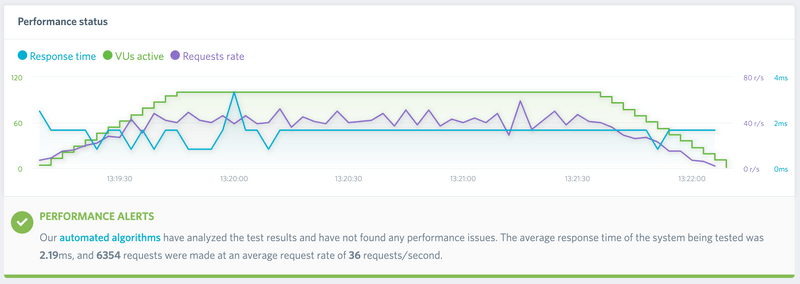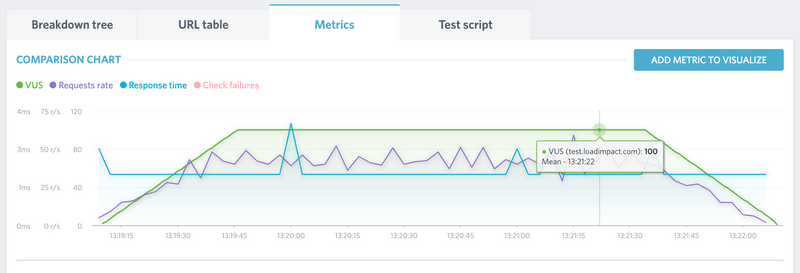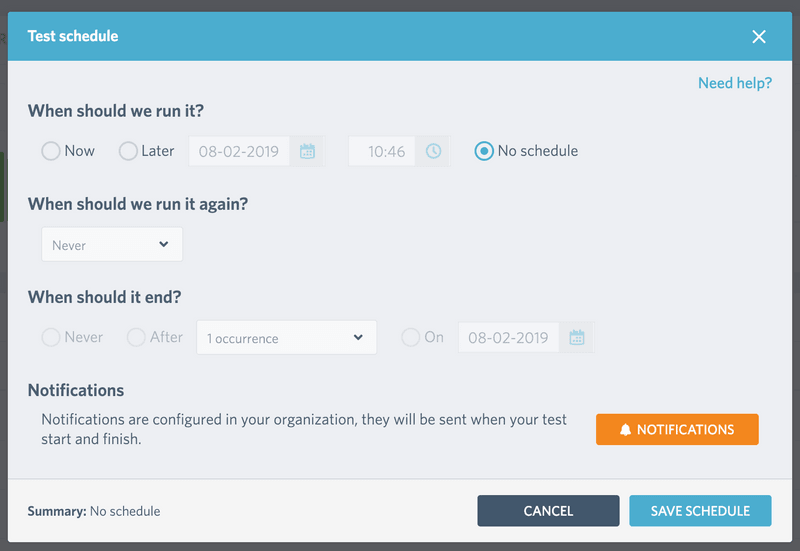A new year of load testing fun has begun. Lots of things have happened since the last product update email. We’ve built a new tool to convert JMeter JMX files to k6 JS test files, we’ve launched an OSS program and have a number of exciting product updates to share with you.
There have also been two k6 releases since the last product update email, meaning a bunch of bugs have been fixed and a number of requested features added. See the list of changes below.
Starting with this product update we’ll also start sharing our short-term roadmap to give you an idea of what’s to come.
Happy reading!
NEW! Insights-only pricing 🎉
In December we launched Insights-only pricing. You can now purchase Insights without Cloud Execution, great if you execute all your tests locally/on-premise/behind-the-firewall. Plans start at \$59/month, see available plans. You can upgrade to a plan with Cloud Execution at any time, with proration.
NEW! JMeter to k6 converter 🎉
We’re excited to announce that we have the first version of our JMeter to k6 converter out. It supports a bunch of common JMeter samplers, logic controller, assertions and post-processors, see the repo on Github for more information, installation instructions and usage guide:
https://github.com/loadimpact/jmeter-to-k6
Thanks to @bookmoons for the implementation!
NEW! Load Impact Open Source Program 🎉
Another exciting announcement is that we have launched an Open Source program to provide free annual Load Impact subscriptions (Developer or Team plan) to qualifying OSS projects:
https://loadimpact.com/opensource
Load Impact v4.0 Updates
General
Unlimited team members: All v4.0 subscriptions now include unlimited team members. If you’re on one of the standard v4.0 subscription plans you’ve already been retroactively upgraded. If you’re on a custom v4.0 plan you need to reach out to our customer success team at customersuccess@loadimpact.com to have the upgrade applied.
Delete tests: You can now finally delete tests, and not only individual test runs. You’ll find the "Delete test” button on a test’s overview page.
Billing page: We’ve redesigned the billing page to better present what is included in your subscription and how many test runs remain for the current billing period.
Usage-based trial: The trial subscription has been changed from being time-based to usage-based. If you’re currently on a time-based trial and would like to be moved to a usage-based trial let us know by replying to this email or contacting support.
Insights
Always-on performance alerts: The performance alert feature is now always communicating the status of the automatic result analysis in Insights.
Metrics tab: We’ve made the "Analysis” panel more visible as the "Metrics” tab amongst the other tabs in the Insights UI.
Cloud Execution
k6 Updates
We’ve made two new released of k6 since the last product update, including some new features but mostly fixing bugs.
We’re also changing the primary support channel for k6 away from Slack and to a Discourse-based forum: https://community.grafana.com/. Slack has worked well but we feel he change to a forum will open up discussions, and support, to more users that aren’t on Slack.
v0.23.0
This release brought a couple of new minor features and a whole lot of bug fixes, see the link above for the full release notes. Thanks to @entone, @mariolopjr and @tkbky for contributing to this release!
Release notes
https://github.com/loadimpact/k6/releases/tag/v0.23.0
New features
New option: No Cookies Reset (noCookiesReset for in-script option or K6_NO_COOKIES_RESET for env vars)
New option: To discard the response body or to specify its type.
k6/http: The Response.json() method now supports a selector argument, to extract specific parts of the JSON response.
New option: Option to disable the summary at the end of a test .
New option: Ability to set a minimum iteration duration.
Docker: Automated Docker image builds based on master branch will now be tagged with "master” and "latest” tag will point to latest official release.
Breaking changes
Metric names are now restricted to only allow Unicode letters or numbers, spaces, and the following special characters: ._!?/&#()<>%-. They also need to be between 1 and 128 characters. Previously practically anything was a valid metric name.
v0.23.1
A bug fix release that amongst other things fixed a bug introduced in v0.23.0 with how the ext.loadimpact options were handled causing the load zone distribution config to always be replaced with a single load zone, "amazon:us:ashburn” (Ashburn, US), when run in the cloud.
Release notes
https://github.com/loadimpact/k6/releases/tag/v0.23.1
Upcoming Load Impact v4.0 Features and Changes
Here are the top features we’re working on in H1 of 2019:
Insights UX/UI update: we’re in the process of a redesign of Insights that strives to simplify the UX/UI and surface the important data in a better way.
Test comparison: being able to easily compare a test run with a baseline or previous test run.
Test result CSV exports: downloading test results as CSV for processing/reporting.
Arrival-rate execution: configuring test execution based on arrival-rate of VUs, which will make it much easier to run requests-per-second based tests for testing APIs.
Per-scenario ramp-ups: will make it possible to have different VU ramp-ups and duration for different scenarios in the same test.
Execution logs: will make it easier to debug tests by getting access to k6 execution logs and console.log() messages in Insights.
SAML-based Single Sign-On: to make provisioning/deprovisioning of team members easier for companies using an Identity Provider.
Don’t forget: See our Product Ideas portal for more upcoming features and proposed ideas to be added to our roadmap. Be sure to cast your vote(s) to influence the priority!
Load Impact v3.0 Updates
The GPG keys of the Server Metrics Agent Linux repositories have been changed. Please update the key on servers where the agent is installed by following the instructions from packagecloud.io (the Server Metrics Agent repo is: https://packagecloud.io/loadimpact/server-metrics-agent).
The proxy recorder has been deprecated and removed from the service. We advise users to look at our OSS Fiddler plugin to record user scenarios for v3.0 and v4.0/k6 via a proxy.




